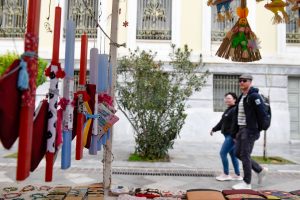Four in 10 Greeks will be spending less on edibles, drinks, gifts and travel for Orthodox Easter on May 5, according to a study released this week by Greece’s Retail Consumer Goods Research Institute (IELKA).
Easter is the biggest celebration in Greece marked by family get-togethers, a traditional feast with lamb, cheese, eggs, and sweets, gift-giving, and travel.
This year, hit by persistent inflation, many Greeks will be dishing out less on food and drink, and having smaller dinner parties. According to the study carried out on a representative sample of some 800 consumers across the country, families will be spending on average 190 euros for Greek Easter: 120 euros for food and drinks and 70 euros for gifts.
Other key study takeaways include:
– 26% – down from 53% before the debt crisis – said they will be traveling for Easter to their hometowns outside Athens which includes islands or villages on the mainland
– 43% said they would be attending a large Easter feast of more than 10 people up from 40% in 2023 but down from 67% in 2019
– 50% up from 43% said they would be baking at home with 79% claiming they will be coloring eggs – a Greek Easter tradition – up from 62%
– 33% said they would be roasting lamb on a spit up from 32% in 2023 but down from 67% in 2019 and 46% in the oven.
In efforts to rein in the soaring prices of goods ahead of Easter, the Greek government launched on Monday the so-called ‘Godparents’ Basket’ through to May 4. The initiative requires retailers selling children’s toys and Easter goods such as candles (lambades), stuffed animals, and chocolate eggs, to fix the lowest prices and display these clearly.





